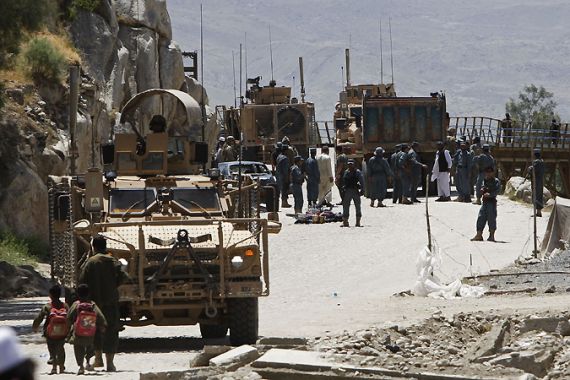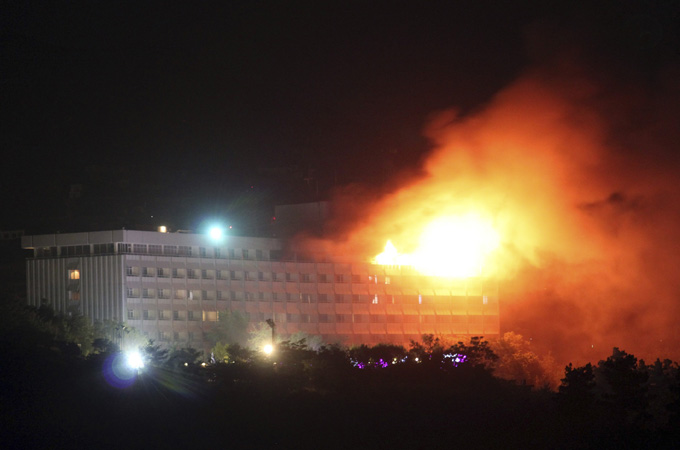NATO kills ‘senior Afghan Haqqani leader’
Alliance says Ismail Jan provided “material support” to attackers of Inter-continental Hotel.

 |
| The attack on the Kabul hotel, which NATO says involved the Haqqani network, left at least 12 civilians dead [Reuters] |
NATO forces in Afghanistan say they have killed a senior member of the Haqqani network involved in an attack on Kabul’s Inter-continental Hotel on Tuesday night.
Ismail Jan, the deputy commander of the Haqqani fighters in Afghanistan, was killed in “precision airstrike in Gardez district” of eastern Paktiya province, the NATO-led International Security Assistance force said in a statement on Thurday.
“The Haqqani network, in conjunction with Taliban operatives, was responsible for the Tuesday night attack on the Kabul Inter-continental Hotel which killed 12 people, including a provincial judge,” the statement said.
Jan’s death could not be verified independently.
The Taliban claimed responsibility for the hotel attack, but Nato said it was carried out jointly with the Haqqani network.
NATO said Jan was tracked down based on “intelligence reports from Afghan government officials, Afghan citizens and disenfranchised insurgents”.
But one Afghan official aware of the incident told al Jazeera the operation was carried out entirely by the international forces.
“It is totally a matter of the international forces,” he said, saying the strike was not in Gardez, but a district outside the provinicial capital.
“I have never heard of Ismail Jan and whether he was connected with Haqqani,” he said.
NATO officials said they stood by their initial statement.
“We have credible evidence that that he [Jan] was Haqqani’s number two guy in Afghanistan – a deputy to Haji Mali Khan,” NATO forces spokesman Major Tim James told Al Jazeera.
“He provided material support to the attackers and facilitated their movement.”
‘Hallmarks of Haqqani’
The overnight assault by heavily armed gunmen and suicide bombers on the hotel ended in the early hours of Wednesday morning with the killing of the nine attackers by security forces.
At least 12 Afghan civilians, two policemen, and one Spanish citizen were also killed in what was one of the most complex attacks on the city.
Hours after the attack, interior and defence ministry officials told the BBC that the attack “bore the hallmarks of the Haqqani network”.
Haqqani, an independent group of fighters that is closely tied to the Taliban and affiliated with al-Qaeda, is mostly based in eastern Afghanistan.
The network also maintains extensive connections to Pakistan’s security services, which views the Haqqani network as a strategic asset against neighbouring India.
“The enemy has achieved its goal, it struck in the heart of the city and left a huge psychological mark on the people,” General Hadi Khaled, a former deputy minister of interior, told Al Jazeera.
“What good is taking out the guy after he has achieved his goal?”
‘Intelligence war’
Reports suggest the Afghan government has launched an inquiry into how the attackers, armed with explosives, anti-aircraft weapons, guns and grenades managed to get into the well-guarded hotel.
Media sources quoted intelligence officials as saying they had warned about the attack beforehand but the police failed to act.
“The problem is that our government has failed to rise up to the intelligence war,” said Khaled.
“It is not for the police to chase down terrorists, we need to prevent such attacks by stepping up our intelligence and acting upon intelligence.”
The attack has again raised questions about the ability of the Afghan army and police to take full charge of the country’s security as NATO prepare to begin withdrawing its forces this autumn.
Khaled believes the government has the ability and the forces to take on the responsibility, but they are not well managed.
“Our forces are strong, but they are not used efficiently and there is no co-ordination,” he said. “We need to adjust ourselves to the nature of this war.”